From clay to cash: The job creation path Ghana keeps ignoring
)
If you have ever travelled along the Accra–Aflao road, then you must have spotted a cluster of beautifully decorated clay pots on display by the roadside—beginning from a town called Vume, where they are made, through Tefle, where one of former President Rawlings’ houses is located, to Sokpoe in the lower Volta Basin.
Guess how long some of these pots have been on display! The owner of Peace and Unity Pottery and Ceramics, the company that produces these clay pots, has revealed that some of them have been displayed there for between ten and fifteen years.
That’s intriguing, isn’t it? But please, don’t get it twisted. This surprising revelation does not in any way mean that the pottery business in Vume is dormant. In fact, Stephen Kwashie Bonny has been involved in this work for the past eighteen years, and if it were not profitable, he would have shut down the factory long ago.
He stated that he is truly earning a living from the pottery business and enjoys it immensely. As a matter of fact, he is currently expanding the factory by constructing a new site, and all the pots you see at the aforementioned locations belong to him.
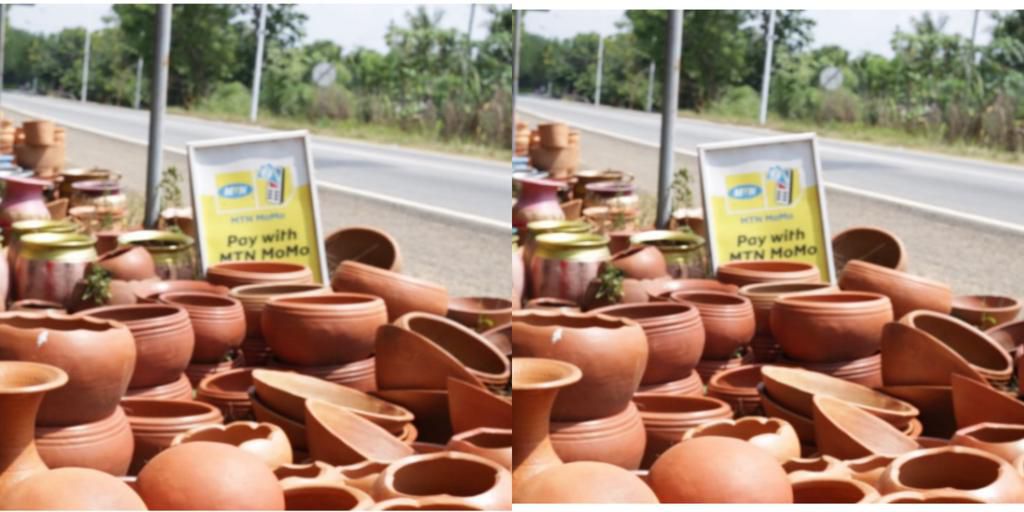
“When we started this business about eighteen years ago, sales were very good because we are located along an international road. We used to export the pots to Togo, Nigeria, and Burkina Faso, aside from distributing them to other parts of Ghana, mostly Accra,” Kwashie Bonny said. “Sometimes we gave them to people on credit, and they paid us after an agreed period of time. But currently, sales are down because it is the dry season. Business thrives in the rainy season, as that is when people plant more flowers.”
This is the trade he has practised for close to two decades—through which he has been able to provide for his family, including buying a car, building his own home, and educating his children, some of whom are now abroad.
He was emphatic in stating that anyone who forms a negative opinion about his business simply because the pots are always seen on display along the Accra–Aflao road would be mistaken. Kwashie Bonny explained that the market is constantly replenished: as soon as someone buys a pot, the space is filled with a new one. Some people place bespoke orders that are crafted specifically for them and therefore do not appear on display.
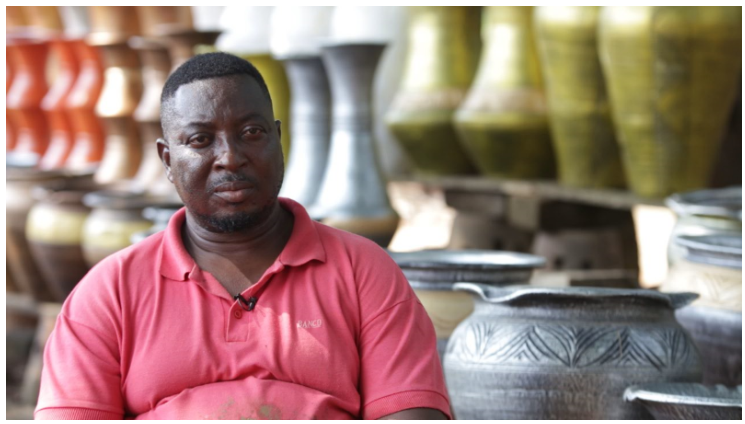
Wife’s Unflinching Support
As the saying goes, beside every successful man is a woman. Stephen Kwashie Bonny has not been in this pottery business alone—he has enjoyed the unwavering support of his indefatigable wife, who has vowed never to pursue any other occupation, having discovered the joy and financial rewards that come with pottery.
Agnes Bonny said her husband had set up a large store for her, but upon realising that the pottery business offered her more than her personal venture, she abandoned it to partner with him—and has never regretted the decision.
“This work is a good one, but people don’t understand. Initially, when we started, people mocked us,” she said. “But I was the one selling the pots, and I knew the benefits, so I was determined to learn the pottery craft. My husband established a store for me, but I gave it up for this business.”
“It is lucrative, because this is the work we have done for years through which we have educated all our children. Some are teachers, others are abroad—but they all know how to make pots.”
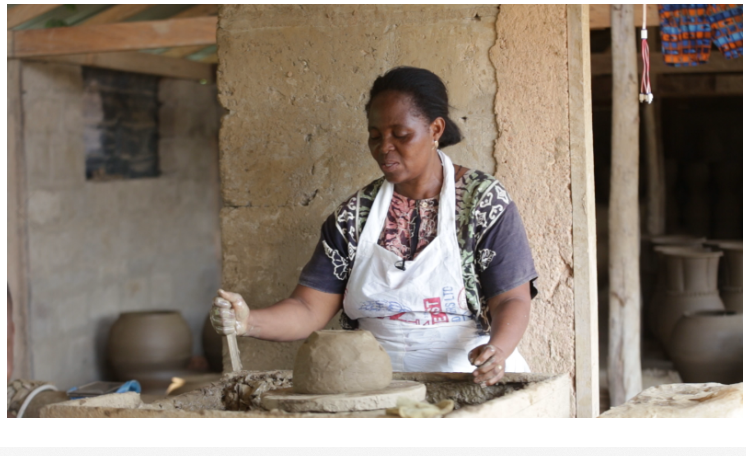
Agnes joined her husband in appealing to the Government of Ghana to consider investing in the pottery industry as part of its industrialisation drive, in order to create jobs for the many unemployed youth in the area.
“The youth who are loitering about should take an interest in learning this trade. It is good for young ladies—it enables them to earn a living and contribute meaningfully to the nation.”
Employment Potential
Over the years, successive governments have failed to implement policies that offer sufficient employment opportunities for the growing population—worsening the unemployment crisis in the country.
As of 2017, more than 1.2 million Ghanaians aged 15 and above were estimated to be unemployed, representing 11.9% of Ghana’s total population.
According to the Labour Force Survey Report by the Ghana Statistical Service, of that number, 714,916 were female (57.2%) and 535,997 were male (42.8%).
The aim of the Labour Force Survey was to collect basic data on employment trends in Ghana and provide statistics to inform decision-making to improve the job market.
While these and other statistics are readily available, successive governments have shown little commitment to utilising them in policy formulation aimed at addressing unemployment.
Peace and Unity Pottery and Ceramics has, at present, provided gainful employment to at least fifteen individuals in the area—excluding apprentices and interns.
Stephen Bonny said even more locals could be employed at his factory if he were supported to expand and diversify production using clay.
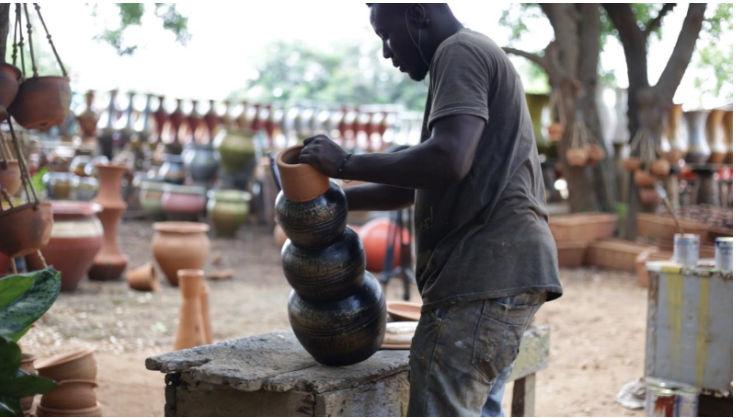
Felix Morkar, one of the painters who enhances the pots’ appearance, said he has been doing the job for the past ten years. He explained that their painting technique is far more specialised than regular painting.
“Of course it is lucrative. When I completed Junior High School, I didn’t continue, and this is the work I’ve done for years to support my younger siblings in school and take care of my personal needs. It’s a very nice job, but it’s difficult to learn—especially mastering how to mix colours,” Morkar said.
Evolution and Usefulness of Clay Pots
As the world evolves, various innovations have rendered traditional items like clay pots increasingly obsolete. Plastic and metal products have largely replaced clay pots for domestic purposes—except for flower planting.
People now tend to opt for plastic and metal items under the impression that they are more durable or aesthetically pleasing.
Nevertheless, like all things, clay pots have their drawbacks, but research suggests their advantages far outweigh the disadvantages.
)
According to a study published on Quora.com by Rachna Jain Khanal, an engineer and quality control officer at Siddhartha Pellet Feed Pvt Ltd, clay pots:
Circulate steam throughout cooking, allowing for more moisture and enabling cooking with less oil and fat.
Being alkaline, clay neutralises the pH of food, acting as a natural detoxifier. Surprisingly, clay contains all essential vitamins—even Vitamin B12.
Their slow cooking process retains nutrients, resulting in tastier food.
Clay pots retain heat longer, reducing the need for reheating and thereby preserving nutrition.
When properly seasoned, clay pots become highly durable.
The steam ensures meats remain moist and tender. Clay pots are excellent for cooking whole chickens, pork chops, corned beef, pot roasts, and other slow-cooked meals, as well as artisan bread.
These are just a few of the culinary benefits of clay pots. Beyond cooking, clay can also be used to manufacture roofing tiles, bricks, drinking vessels, earthenware, water closets, flower pots, and basins—products which Kwashie Bonny says his company is capable of producing, if they had the necessary machinery.
Patronising Made-in-Ghana Products
American businessman Jean Paul Vandenbrauke, while driving to Sogakope, was captivated by the sight of the beautifully arranged clay pots and stopped to admire them.
He encouraged Ghanaians to patronise clay pots not only for household use but also as cultural souvenirs that can be passed down through generations.
“A plastic thing is functional, but we all need beauty...”
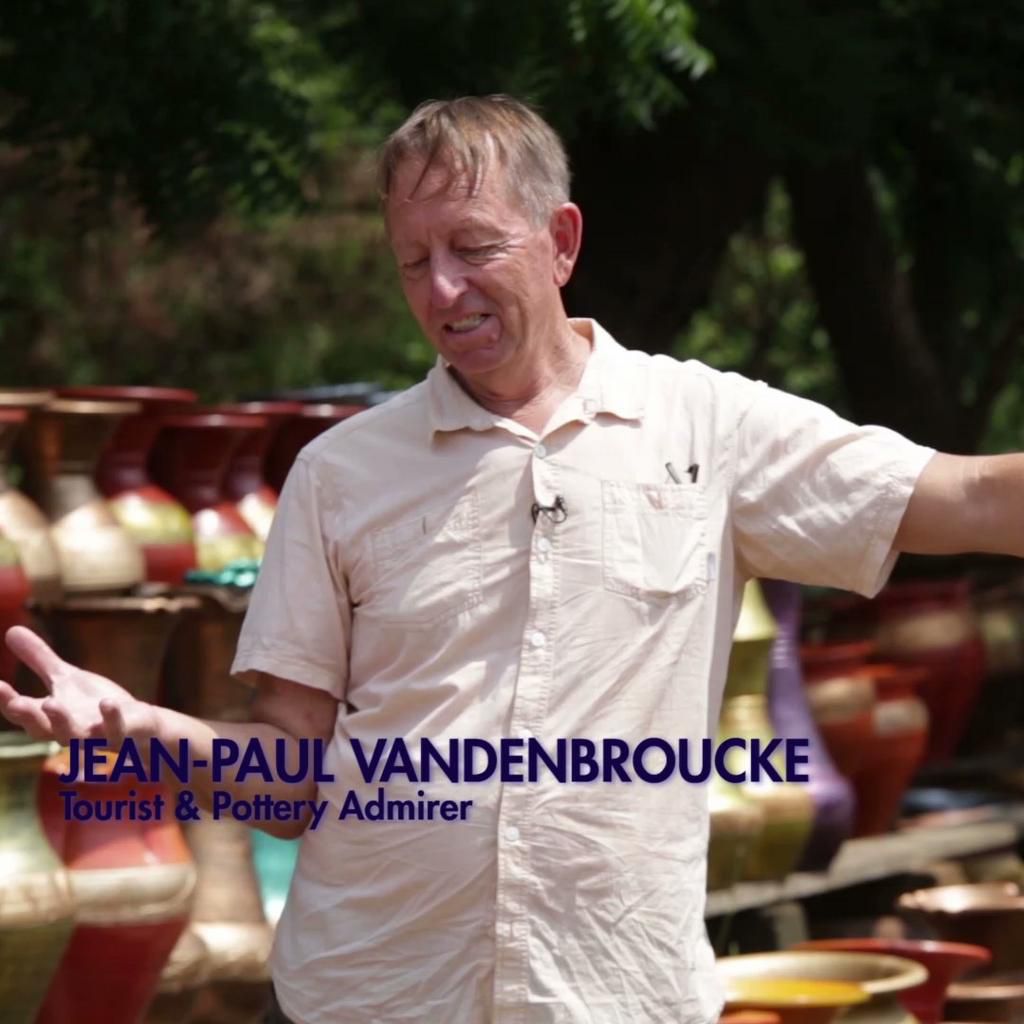
American businessman Jean Paul Vandenbrauke, while driving to Sogakope, was captivated by the sight of the beautifully arranged clay pots and stopped to admire them.
He encouraged Ghanaians to patronise clay pots not only for household use but also as cultural souvenirs that can be passed down through generations.
“A plastic thing is functional, but we all need beauty...”

)
)
)
)
)
)
)
)
)
)
)
)
)
)
)